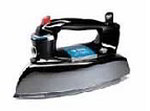Support Operations for Garment Manufacturing
As is the case with many industries, garment manufacturing requires multiple support operations to enable production in the facility. Many of these support operations are common to any manufacturing industry, such as administrative functions, facility and equipment maintenance, and boiler and backup power generator operation.
Administrative Offices

Description
The administrative offices associated with a garment manufacturing facility are typically proportional to the size of the manufacturing operation (i.e. larger factories require more administrative support). Administrative staff manages corporate description such as human resources, finance and accounting, billing, health and safety, and environmental compliance. Offices are equipped with basic technologies and amenities, such as computers, facsimile machines, printers, filing equipment, desk space, and meeting rooms. In some instances, retail customers may also maintain on-site administrative space for quality assurance personnel.
Functions
- Processing order and preparing invoices
- Conducting marketing and sales
- Managing human resources
Steam Generation

Description
All garment factories had an on-site boiler to centrally generate steam for garment ironing. In most facilities, the ironing boards are attached to a ventilation system that captures the heat emitted from the iron and exhausts it to the outside environment. The quantity and size of boilers located on-site are proportional to the manufacturing operation.
Functions
- Onsite boilers centrally generate steam to support ironing operations.
Power Generation

Description
Garment factories also maintain and operate on-site diesel-fueled generators as a source of backup power. The generators are primarily used when (1) island demand for Commonwealth Utility Corporation (CUC) electricity service exceeds capacity or (2) a typhoon temporarily causes a power outage.
Functions
- On-site diesel generators provide backup power, as needed.
Food Preparation

Description
Most garment factories had an on-site kitchen to prepare meals for employees. Kitchens are typically equipped with refrigerators and freezers, a food preparation area, ovens, propane-fueled stoves, and several large sinks. Meals are served in a cafeteria-style manner during set dining hours. Limited food preparation may also occur in the shared kitchen areas in dormitories.
Functions
- Meals are prepared on-site for employees.
- Kitchens are equipped to meet basic food storage, preparation, and cleaning needs.
Employee Housing

Description
Several garment manufacturers offer on-site housing for employees. Typically resembling dormitories or military barracks, employees may share a room with up to 5 other employees (determined by the square footage of the room). Housing facilities often have shared kitchen and bathroom areas, though most often a sink is located in each worker room. However, rooms with a private bathroom may be available for management employees.
Functions
- On-site dormitory-style housing is often available to employees at larger garment factories.
- Rooms are most often designed with shared bathrooms and kitchen areas.


